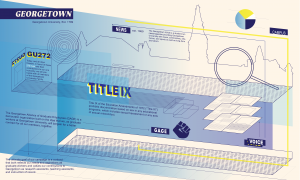A big change could be coming to GUSA.
Several GUSA senators have formed working groups to rewrite GUSA’s constitution with the goal of restructuring advocacy efforts. They hope to have the changes—which include abolishing the Senate and eliminating many appointed positions in the executive—approved in a referendum that the student body would vote on in February 2021.
Georgetown students have long called for GUSA to be reformed or even outright abolished. These calls reflect a perception held by some that GUSA cannot currently advocate effectively for the student body. Many of the senators who were elected this fall ran on platforms to make GUSA a more effective and representative body, and the proposed constitutional reforms are how these senators hope to put their promises into action.
Nicole Sanchez (SFS ’22), the chair of the Senate’s Ethics & Oversight Committee (E&O), introduced the constitutional restructuring project at the Senate’s Nov. 23 meeting. E&O, the GUSA committee in charge of adjudicating issues related to GUSA’s conduct and constitution, created two subcommittees to work on the project. The first committee is dedicated to the Senate restructuring, and the second is dedicated to the executive restructuring.
Sanchez emphasized that the details of the restructuring project are still being worked out by the subcommittees but outlined some of the likely reforms in an interview with the Voice.
The Senate would be abolished entirely and merged with policy teams from the executive. Currently, senators have the option of joining the Policy and Advocacy Committee (PAC), where they work to promote policy changes. Senators in PAC can be appointed as chairs of a policy team specializing in a specific issue, and they work with the executive policy team on their issue.
While PAC currently works separately from executive policy teams, the restructuring project would create one set of policy teams. All students would be allowed to join these teams voluntarily.
The restructuring project also aims to eliminate the other functions of the Senate, such as writing and voting on formal legislation, making senators’ sole responsibility to work in PAC.
Additionally, the project would change how advocacy chairs are elected. Senators are currently elected by their graduating year with a certain number of senators elected from each class. Sanchez said the subcommittees hope to change this policy so senators are instead elected by policy area, running as chairs of policy teams and elected based on their qualifications to advocate for specific policy issues.
The final change the restructuring program hopes to bring is eliminating many appointed positions and clarifying the responsibilities of people within the executive. According to Sanchez, there are many redundant and ill-defined positions within GUSA that hinder advocacy efforts. The goal is for the restructuring project to give GUSA members more direction in their advocacy.
The constitutional revisions are meant to make GUSA more accessible and more effective, Sanchez said. Multiple layers of bureaucracy and elitism discourage interested students from participating in GUSA, which harms the body’s ability to advocate for all students, she argued.
“A lot of people believe that Robert’s Rules of Order, which are the rules in which we have to conduct ourselves in any GUSA-related meeting, are extremely elitist,” Sanchez said. “If you say something wrong, someone’s going to call you out and shame you publicly.”
She added that the process of writing legislation can be inaccessible as well. “To some students, this is just common knowledge, but to a lot of other students, this is new,” she said.
Sanchez also criticized GUSA’s current structure for making advocacy difficult. To propose changes to university policy, senators must draft legislation that must pass a committee and the Senate as a whole before they can begin to work on advocacy.
This structure, Sanchez says, harms the Senate’s advocacy work. “You have to go through so many steps before you get actual work done,” she said. “It’s a very scary experience, and it’s very discouraging to people who’ve never been in these spaces or introduced to these procedures.”
The subcommittee hopes to introduce legislation to get the constitutional revisions on the ballot for a university-wide referendum. If approved by at least two-thirds of the Senate, the student body will have an opportunity to vote on the revisions in February. The revisions will be approved if at least half of the students voting and one-fourth of the entire undergraduate student body vote in favor.
While the exact details of what students will vote on are not yet finalized, Sanchez argued the Senate’s restructuring efforts are still valuable. “There may be better ways, and something may change along the way, but us taking a step forward into restructuring how students are fought for and advocated for is super important,” she said.





